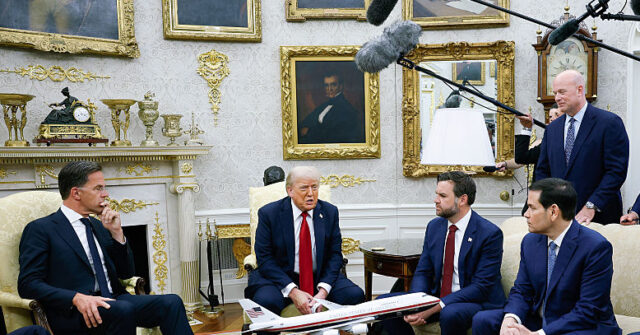“I’m not done” with Russian President Vladimir Putin, President Donald Trump said as he praised the United Kingdom as a model NATO ally, making explicit mutual defence and trade preference are linked.
The NATO alliance has shaken off its “obsolete” era by “paying their own bills”, U.S. President Donald Trump told British state broadcaster the BBC overnight in an interview following his meeting with the body’s Secretary General Mark Rutte at the White House on Monday.
President Trump told the broadcaster he supports the founding principle of NATO of common defence — that an attack on one is an attack on all — but questioned just how dedicated many of its members really are to that in turn.
President Trump said, per a transcription provided by Reuters, that: “One of the problems with NATO, as I said, we have to fight for them, but will they actually fight for us if we had a war?. Some European states, despite being members of NATO, have small militaries with limited capability.
There are some stalwart allies in NATO, though, the President said. He continued: “I will say this, I believe that the UK would fight with us,… I think that they would be with us. I’m not sure that a lot of the other countries would be.”
This certainty that the United Kingdom is a faithful ally to Washington is not taken in isolation, President Trump said, and factored into his other decisions about dealing with the wider world. Britain was the first country to get a tariff-busting trade deal this year, and Trump said the two very very much linked.
He said: “that’s why I made a deal with them… for the most part, in terms of [Britain’s] competitors, and in terms of the European Union, I haven’t made a deal”.
The United Kingdom has one of two major militaries in European NATO, alongside France. But the French military has long been fiercely independent and scornful of dependence on, and involvement with, America. NATO’s common defence clause has only been invoked once in the history of the alliance and that was in response to the September 11th 2001 attack on America, and France did not contribute to the subsequent invasion of Iraq.
In the BBC interview President Trump also revisited the remarks he’d made alongside NATO Secretary General on Monday, when he discussed his growing frustration with Russia’s Putin and his stringing-along of the peace process, which appears to have now all but stalled.
Telling the BBC he trusts “almost nobody, to be honest with you”, President Trump said he thought there was a peace deal reached four times but that these would immediately be followed by more bombings. Of his attitude going forwards, he remarked: “I’m disappointed in him, but I’m not done with him. But I’m disappointed in him.”
On Monday, Trump had announced a new programme to get weapons to Ukraine, but allowing European states to send their own weapons to Kyiv and then pay to buy more stock to replace them from the United States. The President also issued a warning, stating Russia’s Putin had 50 days — to the start of September — to make peace in Ukraine or else have the screws turned in its lucrative global trade in energy exports.
Rather than placing tariffs on Russia directly — which has seen mixed results over the course of the war so far — the U.S. would instead place a punitive 100 per cent rate on Russia’s customers, encouraging them to buy elsewhere.
President Trump said: “we’re going to be doing very severe tariffs… doing secondary tariffs if we don’t have a deal in 50 days, it’s very simple, and they’ll be at 100 per cent, and that’s the way it is, couldn’t be more simple. I hope we don’t have to do it”.
Read the full article here


